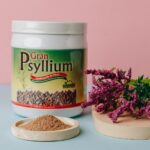Protein is one of the three macronutrients your body needs to stay fit and healthy, together with fats and carbohydrates. This is especially true if you’re an athlete or when you’re on the go and need something quick and easy. That’s precisely where protein bars come into play.
But there are lots of protein bars out there, and it’s not always easy knowing which ones are best. Are protein bars good for you? And if you should include protein bars in your diet, where can you find the healthiest protein bars? The following quick guide will walk you through everything you need to know.
Are Protein Bars Good for You?
Everyone needs protein as part of a balanced diet. But does everyone need protein bars? It seems like a good idea, doesn’t it? After all, most protein bars provide you with a good amount of protein, and they promise to keep you full.
But like anything else, too much of a good thing isn’t always a good thing. And just as we can overdo it with fats and carbs, we can also consume more protein than is healthy and/or necessary for us.
When we eat too much protein, we can strain our kidneys, and if this happens too much, we can end up with kidney stones or even more severe kidney problems.
You can obtain protein from many different whole food sources, like meat, poultry, soybeans, lentils, and nato. You can also get protein from processed forms, such as protein powders and, of course, protein bars.
And while it’s more difficult to go overboard with protein when you eat whole food sources, it’s easy to consume too much of it when you get your protein from powder and/or bars.
That’s because bars and powders often pack quite a lot of protein into one serving. For example, some protein bars can contain up to 30 grams of protein – in just one bar! And we usually eat them in addition to the other forms of dietary protein.
In the end, we can eat more protein than we need to!
Another concern with some protein bars is that they can be full of preservatives and added sugar, leaving you with a high-calorie food that you probably don’t need.
Who Should Eat Protein Bars?
At this point, you probably think we’re discouraging you from eating protein bars. But that’s not the case.
It’s just important to approach them with the proper knowledge.
For example, since we know protein bars can be packed with protein, if you plan on eating one, be sure you don’t overdo it with protein in your other meals.
Another point to remember is that many protein bars are loaded with sugar, preservatives, additives, gums, artificial flavors, and less-than-ideal forms of protein, like soy and whey protein isolate.
So, it’s a good idea to seek out protein bar brands that use top protein sources and keep all that other stuff to a minimum.
Ingredients to Look For in Protein Bars
When shopping for protein bars, try to check the ingredient list to see where the protein is coming from.
When possible, always get protein bars that rely on whole food sources rather than highly processed protein, like soy or whey protein isolate.
Here are three more tips on ingredients you should look for:
- Peanuts, peanut butter, or any nut or seed butter, for that matter, are good choices. They provide a slow and steady source of fuel.
- Instead of “sugar” look for natural sweeteners, like dates or mango. This will help keep your blood sugar levels from skyrocketing.
- Finally, look for healthy fat sources, like coconut oil, nuts and seeds, like almonds, cashews, and chia seeds. This will help you stay fuller for longer, and prevent snacking in between meals.
5 Best Protein Bars from Amazon
Now that we know all about different types of protein and the importance of not overdoing it with protein – especially added protein – let’s talk about some of the best protein bars.
Before we do, there’s one last thing to bear in mind:
According to the Dietary Reference Intake (DRI), we should eat 0.8 grams of protein for every kilogram of body weight. That comes to about 0.36 grams per pound.
So, if you weigh approximately 140 pounds, you should aim for about 50 grams (or less) of protein per day.
RXBAR Chocolate Sea Salt Protein Bars
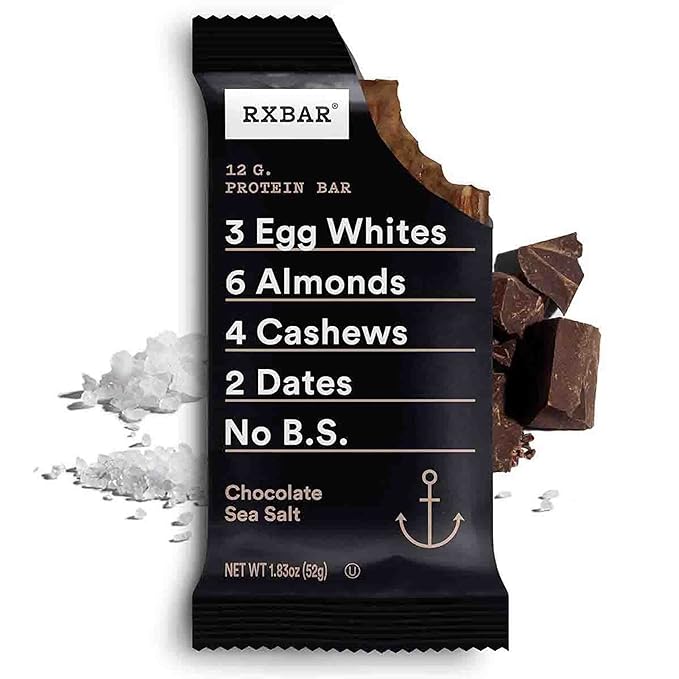
RXBAR Chocolate Sea Salt Protein Bars
– No additives and gluten-free
– Protein from egg whites
– Only real, simple ingredients
If you’re looking for the best protein bars without any additives, RXBAR is the brand for you.
RXBAR has a no-bs approach to nutrition, and with that, all of their protein bars come from whole food sources without any lecithins, artificial sweeteners, or any other food additives.
Most of the RXBAR protein bars contain egg whites, nuts, dates cocoa, or other ingredients for different tastes. Though typically a little lower in protein compared to some other protein bars, RXBAR makes that up with its pure whole food approach.
One RXBAR protein bar contains about 12 grams of protein, but comes without any added sugar – the whole sugar content comes from dates.
Find RXBAR Chocolate Sea Salt Protein Bars from Amazon.
Quest Nutrition Chocolate Brownie Protein Bars
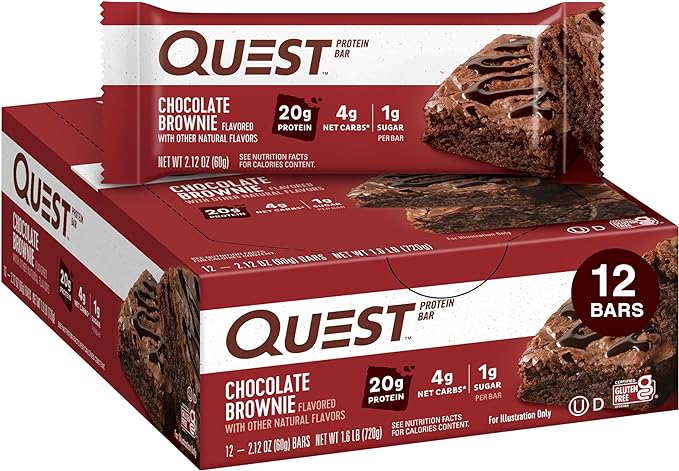
Quest Nutrition Chocolate Brownie Protein Bars
– Complete, dairy-based proteins
– 15g of fiber per bar
– No added sugars, sweetened with erythritol
Quest protein bars have become a household name and the preferred choice among many protein bar fans. It’s easy to see why: with its high protein and low sugar content, plus a huge range of tasty options, Quest bars have dominated the market.
Quest protein bars are based on a blend of two protein types: milk protein and whey protein isolate. However, these protein bars still contain a fair amount of additives you may want to steer clear of: erythritol, lecithin, and sucralose all may have some adverse effects.
Find Quest Nutrition Chocolate Brownie Protein Bars from Amazon.
think! High Protein Bar, Creamy Peanut Butter
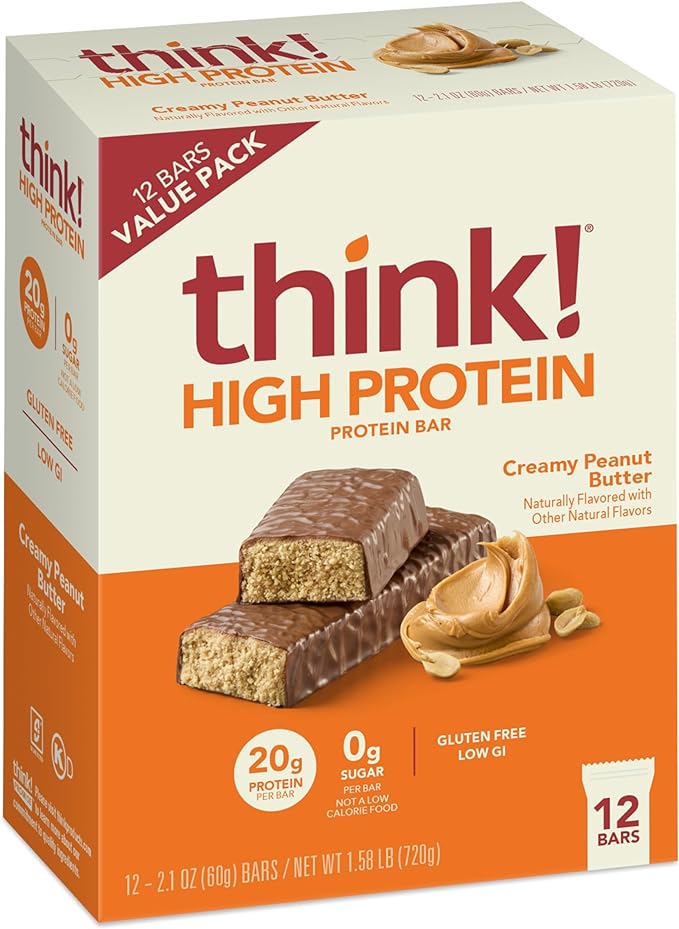
think! High Protein Bar, Creamy Peanut Butter
– All ingredients have been produced without genetic engineering
– No artificial sweeteners like sucralose, saccharin, aspartame
Though Think protein bars may not be as famous as some other brands, these little bars pack a real protein punch. One 60-gram think! protein bar contains 20 grams of protein without any sugar whatsoever!
The Creamy Peanut Butter version contains peanut flour and peanut oil, but the protein itself comes from a blend of three different protein types: soy protein isolate, calcium caseinate, and whey protein isolate.
Find think! High Protein Bar, Creamy Peanut Butter bars from Amazon.
CLIF BAR Energy Bar Chocolate Chip
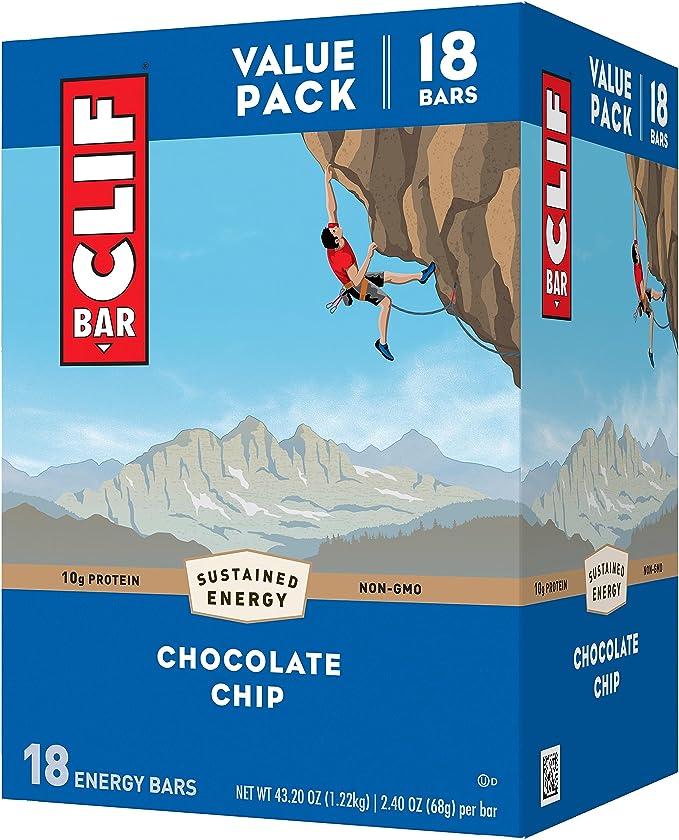
CLIF BAR Energy Bar Chocolate Chip
– Plant-based ingredients, main ingredient is organic rolled oats
– Great for a quick energy fix
– Made with materials harvested from responsibly managed farms
This bestseller protein bar is made with 70 percent organic ingredients and doesn’t contain any artificial sweeteners, trans fat, hydrogenated oils, or high fructose corn syrup.
Each bar contains 9 grams of protein.
The only main downside to this particular Clif Bar is the soy lecithin, which is usually present in chocolatey products. Keep in mind the downsides of soy lecithin and if possible, opt for a protein bar without any lecithin added.
Find CLIF BAR Energy Bar Chocolate Chip from Amazon.
KIND Protein Bars, Crunchy Peanut Butter
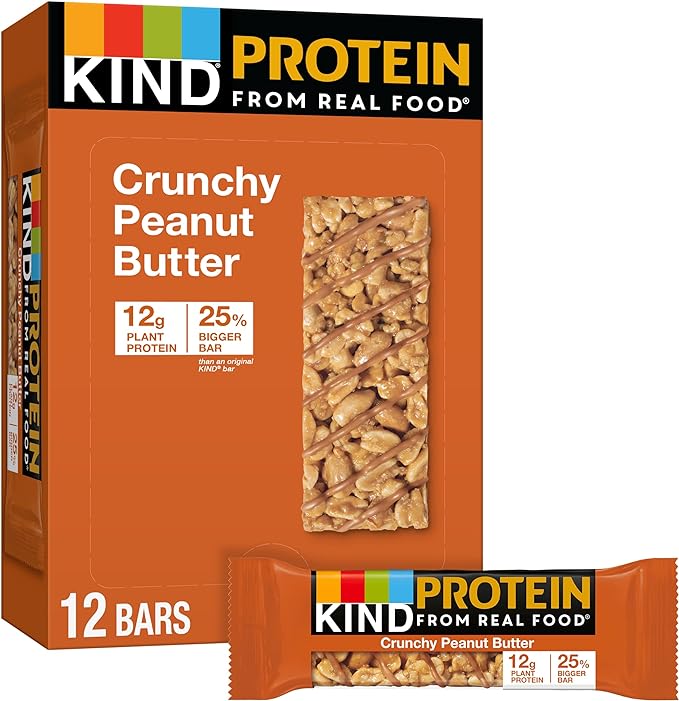
KIND Protein Bars, Crunchy Peanut Butter
– Gluten-free, good source of fiber
– Made with the highest quality non-genetically modified ingredients
– No artificial flavors, preservatives or sweeteners
Like Clif Bars, KIND protein bars also contain soy lecithin, but on the upside, the ingredients focus on peanuts and chicory root fiber, making them a fiber-rich snack.
One KIND protein bar provides you with 12 grams of protein, which is about 14% of your daily protein intake.
The downside, however, is 6 grams of added sugars, which would be better avoided.






